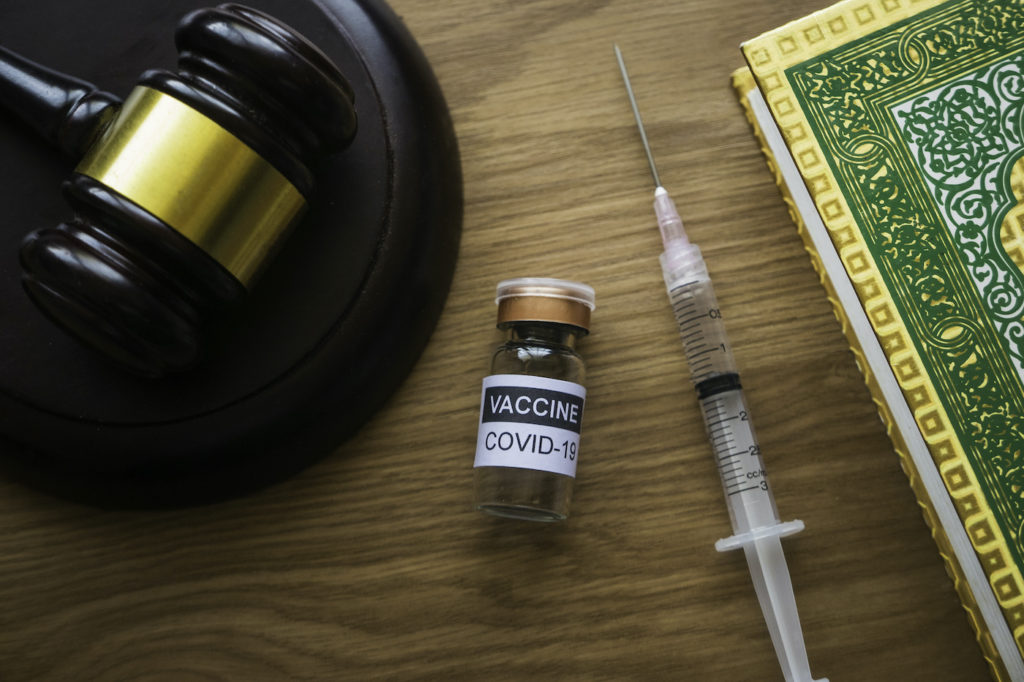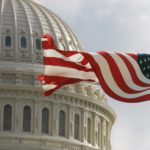Starting this month, New York City is requiring workers in private businesses and teachers at private and religious schools to be vaccinated against COVID-19 in order to keep their jobs. The new directives are the latest in a spate of similar measures that the state and local governments—as well as the Biden administration—have enacted since the summer to slow the spread of the coronavirus. Some, like the federal mandate and the two new NYC directives, expressly allow for religious exemptions. But not all. For example, both Maine and New York State have required that healthcare workers be vaccinated against COVID-19, without the possibility of religious exemptions.
Plaintiffs have filed lawsuits arguing that mandates that lack religious exemptions violate their free exercise of religion under the First Amendment. The lower courts have reached different conclusions, and, so far, the Supreme Court has stayed out of the fray. In October, the Court declined, 6-3, to enjoin the application of the Maine mandate for healthcare workers, in part because two justices, Barrett and Kavanaugh, doubted that the case offered a good vehicle to consider the question. Just this week, the Court declined, again 6-3, to block enforcement of the New York state mandate for healthcare workers, over a spirited dissent from Justice Gorsuch.
The Court has not explained its reasons in these cases. But the justices’ caution is not surprising, for a few reasons. First, religious exemption claims generally pose hard questions, which are particularly troublesome in this context. The COVID-19 pandemic has intensified divisions about the value of religion and religious freedom in our country, and the justices might wish to avoid doing something to provoke further conflict. Second, the Maine and New York lawsuits are currently at the preliminary injunction stage, and the factual records in the cases are still unclear. The Court might reasonably think that it should allow the lower courts an opportunity to consider the claims further before it issues any rulings. Finally, the Court might think that state and local governments will themselves see the prudence of offering religious exemptions, as many already have done, considering the difficulties vaccine mandates have created for healthcare and other services.
The COVID-19 pandemic has intensified divisions about the value of religion and religious freedom in our country, and the justices might wish to avoid doing something to provoke further conflict.
Start your day with Public Discourse
Sign up and get our daily essays sent straight to your inbox.Religious Exemptions to Vaccines Are Unprecedented
The question whether the First Amendment confers a right to a religious exemption in the vaccine context is genuinely difficult. The Court has never held that such a right exists and has ruled in a different context that states have the power to enforce “reasonable” vaccination requirements notwithstanding citizens’ objections. Indeed, according to Douglas Laycock, one of the country’s most prominent free-exercise scholars, before the recent COVID-19 cases, “no state or federal court had ever granted a religious exemption” to a vaccine mandate. The Court will likely think twice before requiring religious exemptions now.
The Court’s decisions on religious exemptions under the First Amendment are famously indeterminate, and predictions of how the Court will rule are often difficult. Under the Court’s landmark ruling in Employment Division v. Smith (1990), a neutral, generally applicable law that incidentally burdens religious exercise is presumptively constitutional. Such a law receives only minimal, “rational basis” review, which is virtually impossible to fail. Only where a law is not neutral and generally applicable, where it substantially burdens religious conduct more than analogous non-religious conduct—for example, forbidding police officers from wearing beards for religious reasons, but not for medical reasons—does “strict scrutiny” apply. In those circumstances, the state must show that the law serves a compelling governmental interest and does so only as far as necessary. The state must show that it could not equally achieve its interest in a way that burdens religious exercise to a lesser degree.
In the vaccine mandate context, each element of the Smith test raises hard questions. Start with the “neutral and generally applicable” standard. Vaccine mandates are typically neutral, in the sense that they do not target religion. Authorities generally wish to slow the spread of the virus, not express disfavor for certain religious groups. But that’s not always so clear. For example, in promoting New York’s mandate for healthcare workers, Governor Kathy Hochul suggested that people who decline vaccines are unintelligent and disobedient to God’s plan. A lower court concluded that her comments reflected not animosity, but a deep concern for the unvaccinated, and anyway did not affect government policy. Reasonable people could differ with that conclusion.
Are Vaccine Mandates Generally Applicable?
Even where a vaccine requirement does not reflect animus against religion, the question of general applicability may be difficult. Virtually all mandates offer a medical exemption for persons at risk of serious complications. Does the existence of such an exemption mean that a vaccine requirement does not apply generally? Proponents argue that medical exemptions differ categorically from religious exemptions, because claims for medical exemptions are much less common and thus much less likely to interfere with a vaccine regime.
Virtually all mandates offer a medical exemption for persons at risk of serious complications. Does the existence of such an exemption mean that a vaccine requirement does not apply generally?
There’s something to that argument, though of course one would need to confirm the facts. But in Fulton v. City of Philadelphia (2021), the Catholic adoption services case last term, the Court ruled that even a theoretical possibility of an exemption for non-religious reasons means that a law is not generally applicable. If that is so, then virtually all COVID-19 vaccine mandates would merit strict scrutiny. It is hard to imagine a state’s refusing, in principle, to exempt people who have medical conditions that make COVID-19 vaccines especially risky for them.
Of course, this reasoning would extend, not just to COVID-19 vaccines, but to vaccination requirements generally, many of which would become subject to a free-exercise challenge. This, too, would create a great deal of uncertainty. In practice, strict scrutiny works like a balancing test, requiring courts to make “all things considered” judgments about the relative weight of competing social goods.
Using a Balancing Test for Vaccine Mandates
Judgments about weighing goods differ, especially in a society as polarized as ours. No one could seriously contest that the state has a compelling interest in limiting the spread of diseases like COVID-19. But do the marginal benefits of a vaccine mandate justify the burdens placed on persons with genuine religious objections? The answer to that question will depend on several factors on which Americans, including judges, differ, such as the value of religious exercise, the need to “follow the science,” and the competence and good faith of public health authorities. Any balance the Court strikes would inflame a substantial portion of the country.
And all this leaves aside what is perhaps the trickiest question: what qualifies as a bona fide religious objection to the COVID-19 vaccine in the first place? Courts typically assume in religious exemption cases that a plaintiff’s objection is sincere and decline to inquire whether the belief is logical or coherent. Religious conviction is always at least partly subjective and thus difficult to assess; besides, the Court has suggested, inquiries into the comprehensibility of religious claims themselves violate the free exercise clause.
In the current context, though, courts might cast aside this restraint. Some religious objections to the COVID-19 vaccine—though of course not all, or even most—seem pretextual, given the fact that the objectors often have received other vaccines, or taken medicines, that present the same moral difficulties they allege that COVID-19 vaccines present. Anecdotal evidence of people abusing free exercise protections to avoid vaccines for non-religious reasons exists, though it is hard to evaluate how much.
Some religious objections to the COVID-19 vaccine seem pretextual, given the fact that the objectors often have received other vaccines, or taken medicines, that present the same moral difficulties they allege that COVID-19 vaccines present.
Individual Conscience Is Sufficient for Exemptions
Furthermore, to receive an exemption, religious practitioners do not need to point to any teaching, doctrine, and tenet that forbids vaccines. The Court has repeatedly made clear that, for constitutional purposes, “religion” may be entirely personal, a matter of individual, rather than group, commitment. “The guarantee of free exercise,” the Court declared in Thomas v. Review Board (1981), “is not limited to beliefs which are shared by all the members of a religious sect.” Thus, to qualify for a religious exemption, a plaintiff does not have to show that he belongs to a particular religious community—or, if he does, that his objections follow from that community’s teachings. It is sufficient for the plaintiff to show that his religious convictions, even if they are unique to him, make his compliance with a law impossible.
There are good reasons for this generous position. America has always valued individual conscience. But one can easily see the complications for public health. Most organized religions have no problem with vaccination and even promote it. But that fact would not prevent individual members from claiming, as a legal matter, that their different understanding of the faith forbids them to receive vaccines.
Moreover, there are millions of “Nones,” now perhaps close to one-fifth of the population, who do not belong to any organized faith but have their own, personal religious convictions. Many Nones find vaccinations problematic; indeed, one survey of religions last summer found that Nones were the “least likely” group to receive a COVID-19 vaccine. If Nones qualify for religious exemptions under the First Amendment—and they would have a good argument under existing case law—administering a vaccine regime could become quite difficult.
How State and Local Governments Might Respond
Given all this uncertainty, and the possibility of inflaming the situation further, the Court will probably allow the issue to percolate in the lower courts and resist (for now) the invitation to rule on whether the First Amendment requires religious exemptions to COVID-19 vaccines. Of course, that’s a separate question from whether state and local governments should allow religious exemptions on their own, as many state and local governments have done.
The Court might hope that those states that have refused to grant exemptions so far will reconsider their decisions. Some possibility exists that they will do so. Vaccine holdouts have started to cause staffing shortages at New York hospitals, just as COVID-19 cases have begun to rise again. Faced with the rising costs of noncompliance, Governor Hochul might well strike a new balance and grant religious exemptions even without a court order. If authorities were to grant exemptions, the First Amendment challenges to vaccine mandates would become moot—a result for which the justices may quietly be hoping.













